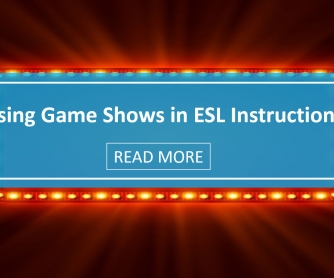
Game shows have long been a staple of English culture. Shows such as Wheel of Fortune, Jeopardy, and The Price is Right have been on television for decades. These shows provide a lot of entertainment for viewers and contestants, but they also serve as great tools to use in the ESL classroom. Read on to discover how you can bring game shows into your classroom.
Wheel of Fortune
On Wheel of Fortune, contestants spin the wheel and guess letters to try and reveal a hidden phrase. Usually they have a category to help them narrow down the possibilities. By watching episodes of the game show, English language learners can begin to discover common spelling conventions and begin to connect words to categories. For example, if the category is Food and Drink, learners will know the answer cannot be anything other than food or drink items. As learners watch more episodes of the show, they'll also begin to see common spelling patterns. For example, if they see an h as the second letter, chances are it is preceded by a w, s, t, or c and the same is true if an h appears at the end of a word.
Learners can also discover a lot about pronunciation as they watch Wheel of Fortune. Just take a look at epic fails from the show to help learners understand the importance of proper pronunciation.
Jeopardy
Jeopardy is the game show for smart people. On the show, players compete to answer questions in various categories. As they watch the show, learners can put their own knowledge to the test in categories related to science, history, pop culture, and more. The categories and clues in Jeopardy often feature clever plays on words, making it a great way to help advanced language learners broaden their knowledge of the English language. The format of clues and answers can also help language learners deepen their understanding of sentence structure. All of the clues are written as sentences while the answers must be given as questions. For example, "What is the Nile?" or "Who is George Washington?" Watching the show can be a great way to help language learners practice forming questions.
Additionally, Jeopardy has become a popular classroom game. Simply download a PowerPoint template and fill in your own categories and answers to help students remember key terms, review elements of grammar, or talk about current events.
The Price is Right
On The Price is Right, contestants play a variety of games that give them a chance to earn money. During the show, English language learners are introduced to words related to money and consumerism. They're also given the chance to hear a variety of adjectives and other descriptive words as the products and prizes are described. As you watch with learners, you can bring up phrases such as "more or less than" and talk about comparative and superlative adjectives. You may also discuss prepositions and ordinal numbers by describing where contestants and prizes are located on the screen or the order in which they are presented.
Family Feud
Family Feud is a show where two teams compete to name words or phrases that correspond with a given topic or question. For example, "Name something that is part of a spaghetti dinner." The answers on the show were collected by surveying people, so contestants must try and think of the most common responses. As they watch the show, English language learners can begin to connect words to different categories. They may also gain exposure to common idioms and phrases. For example, "Name a word or phrase that contains the word 'dog.'"
After watching Family Feud, you can play a similar game in your classroom by using recent vocabulary words or other concepts you have been discussing and having learners try to reveal all of the words or phrases on the board.
Aside from specific elements of the English language, game shows expose English language learners to everyday people and everyday conversations. Many of the conversations between the contestants are not scripted, so learners can see people speaking off the cuff, sometimes with humorous results.
What are some of your favorite game shows? Next time you watch one, think of ways you can bring it into your classroom.
P.S. If you enjoyed this article, please help spread it by clicking one of those sharing buttons below. And if you are interested in more, you should follow our Facebook page where we share more about creative, non-boring ways to teach English.








